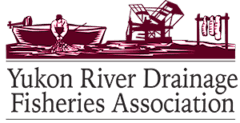The Yukon River Drainage Fisheries Association (YRDFA) has been funded by the North Pacific Research Board to begin a study to learn about and document the values of salmon to people along the Yukon River. This research will take place though case studies in three communities and will include ethnographic interviews of fishers in three age groups – 18-29, 30-54, and over 55. The communities most likely to be included in the study and who supported the research at the proposal stage are Russian Mission, Nenana and Fort Yukon. The project began in July of 2014 and will go through December 2016. Community meetings and interviews will take place in each community in 2014 and 2015. Once the interviews have been analyzed, additional community meetings will be held in each community to review the data and provide community feedback.
Participants will be chosen based on a combination of factors including age, gender, fishing family groups, fishing locations, nominations from the Tribal Councils and other participants, and experiential differences. The project investigator, Catherine Moncrieff, will focus on Elders who have long-term knowledge of fishing, middle aged fishers currently active, and younger people active in fishing and processing.
People along the Yukon River rely on salmon for food, culture, and income. It is well known that salmon has a high value to the subsistence users along the Yukon River but the details of this value are not well described, nor are management decisions in times of shortage currently guided by knowledge of these values. Through this project Yukon River fishing families will have the opportunity to share how they value salmon, why they value salmon, and the ways in which it is most important to them.
The Yukon River Chinook salmon have been in decline for roughly a decade and this has had significant social, cultural and economic impacts to people living in this region. It is important to understand how changes in salmon abundance and availability impact the fishing families that have relied on these salmon for their survival: for food, for family and for limited income. Fisheries managers are faced with challenging decisions about how to balance the need for people to have limited access to the natural resources they depend on and the need to sustain the salmon run for future generations.
Project contact:
Catherine Moncrieff, Yukon River Drainage Fisheries Association
907-382-8990, Catherine@yukonsalmon.org
